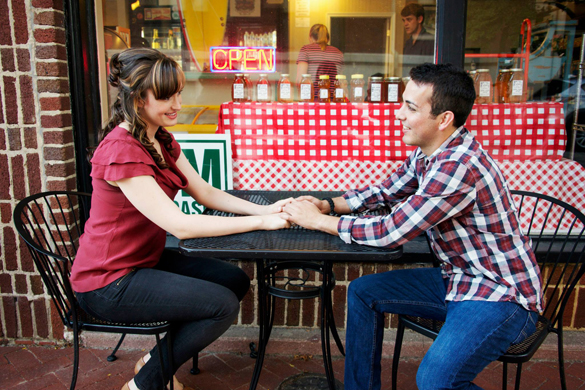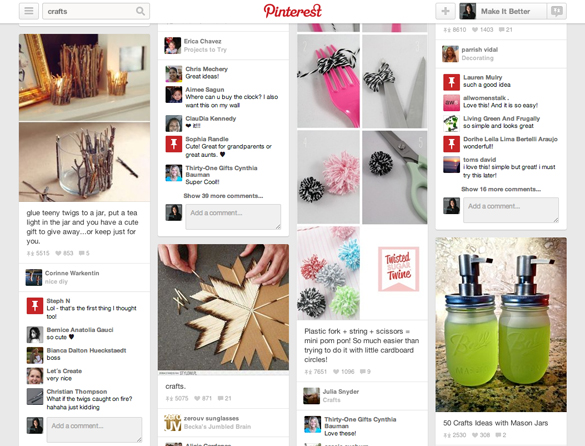I left Facebook for four months, and everyone I know got married.
Or so it seemed. My Newsfeed, that first page you see when you log on, was littered with proposal stories, engagement photos, perfectly lit wedding shots and more exclamation points than I care to remember.
I’m young yet; at 23, I’m just settling into my first professional job, and sharing a spacious apartment with my committed boyfriend in an enviable area code. But, if Facebook is to be believed, what I have isn’t enough; I’m still missing a white tulle princess-cut gown and color-coordinated flower arrangements, and I’m incomplete without a documented, clever proposal. And so, thanks to the beauty of social media and the nascent social anxiety of being a millennial, I’ve become something I hate: envious.

Pictured: Sara Peck and Nat McLaughlin; Photo by Dee Akright Photographers
Social Media Is More Popular Than Porn
In recent months, much has been written about the pervasiveness of social media. According to Fast Company, social media has overtaken pornography as the most popular activity on the web, with 72 percent of all Internet users now active on social media. Its presence is unavoidable, with everyone from pre-teens to octogenarians sharing the minute details of their lives, and psychologists have created new classifications for the social anxiety caused by social media. From the well-documented FOMO (fear of missing out) to the proposed SMAD (social media anxiety disorder), experts seem to agree: Social media can be bad for your mental health.
At every stage of life, socially acceptable milestones and standards create anxiety. Whether we simply lag behind or choose another path entirely, it is easy enough to see what is expected and compare our lives to those around us. Social media—notably Facebook, Twitter, Instagram and Pinterest—elevates the comparison, making the in-your-face success of peers inescapable.
The Painful College Admissions Process
For teens, there’s the pressure of college admissions, while recent graduates fight the rat race of an increasingly competitive job market; for the young 20-somethings cohort, of which I am a member, there is a mad dash to settle down with a family, while those already engaged in familial bliss are treated to unreachable domestic expectations.
“I’m happy for people,” says Chicago Waldorf School senior Sarah Matthews, 17, of her peers’ college admissions success. “I totally appreciate all the hard work they’ve done throughout high school, but when they post about it online, it can seem like a petty, in-your-face kind of thing. College is the first thing I’ve ever really been jealous of people about. It’s a little hard to see it online constantly.”
With college acceptance rates dwindling (Northwestern University accepted just 13.9 percent of applicants for the class of 2017, while Yale University took a record-low 6.72 percent of applicants for the same class), the already competitive atmosphere has burgeoned into a battle royale.
Matthews applied to 13 universities, and as she waits to hear from the remaining schools this spring, she’s forced to see the celebrations and disappointments of her peers documented on social media.
Matthews says she finds it easier to cope with her classmates’ news than that of those she’s “friends” with online. Among her Waldorf class of 14 students, “It’s easier to say, ‘You’ve worked really hard the last four years,’” she says. “You don’t know all of the people you’re ‘friends’ with on social media, so it’s easy to look at their life and think it’s perfect. People only post things that are exciting in their lives.”
Non-Fat, Tall, Half-Caf Latte, Please
After I left college, unable to get a job in my field, I started working full-time at a corporate coffee shop. (Some of you may still remember me as your mostly friendly neighborhood barista.) I took time away from Facebook because I’d yet to reconcile my shame of not working in a professional environment, and I was constantly inundated by status updates and job descriptions of my peers and their loftier, already reached ambitions. I found it was easier to fail in real life than to fail online. Facebook wasn’t merely demanding to know my relationship status; it was prying into the disquieting fear of being unemployable.
And the social anxiety doesn’t end there. A May TODAY Show survey of 7,000 U.S. mothers suggested that nearly half of all moms claim to sometimes suffer from “Pinterest stress – the worry that they’re not crafty or creative enough.” Pinterest, the pin board-style photo-sharing site, has emerged as a haven for crafty mothers spearheading classroom bake sales and children’s birthday parties. According to the survey, moms harbor resentment and envy that they can’t compete with the picture-perfect domesticity that populates the site.

Photo via Pinterest
The situation can be casually defined as “compare and despair,” a fear of personal failure when measured against the expectations of peers. “Social media sites actually feed jealousy by creating the illusion that other people are living happier, more fulfilled lives than our own.” writes Kim Schneiderman, a licensed clinical social worker in Manhattan, in Psychology Today.
Best Foot Forward
We’ve become increasingly aware of how we portray ourselves on social media, going beyond “best foot forward” to prim, prepped perfection. The argument, of course, is that the perceived perfection is only screen deep. The glaze of cherished moments may belie screaming toddlers, unhappy cubicle-dwellers, stressed mothers or fractured marriages. But the perception can be agonizing, particularly to adolescents as they form their own self-concept.
“Kids are getting on Instagram and seeing pictures of people they know doing something they aren’t,” writes social media expert Jon Negroni. “It can be overwhelming for someone between the ages of 13 and 16 to feel like they are missing out on something … Thus, teens like to lie about their lives in order to feel slightly better.”
The answer, it seems, isn’t as simple as just unplugging. While limiting time on social media can be beneficial, some enterprising teens can circumvent their parents. Audrey Grunst, a licensed clinical social worker at Insight Behavioral Health Center in Northbrook, noted that some kids actually purchased “burner” phones with spare cash so they could stay plugged in if their parents took their real phone away.
“Kids are way too far ahead of their parents for them to regulate social media use,” Negroni writes. “Instead, kids (and us) need to be taught how to temper our concern and fixation over social media.”
Grunst recommends parents emphasize the value of downtime and model digital detaching at home. For adolescents already struggling with the anxiety of imperfection, Grunst recommends staying connected—in person. “Find the kernel of truth that you can validate—how much pressure they’re under, what happened to them—and then ask them to problem solve. What do you want to do about this?” The key is to give them the power to self-soothe while supporting and validating their feelings.
As for me, I’m learning to take each engagement announcement and wedding album as a beacon of future happiness, and I’m attempting to channel my envy to happiness for my friends. But I won’t force my sweet, patient boyfriend to settle down even one day sooner than he—or I—is ready.

